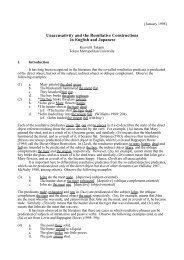Presuppositional Effects of Scrambling Reconsidered*
Presuppositional Effects of Scrambling Reconsidered*
Presuppositional Effects of Scrambling Reconsidered*
Create successful ePaper yourself
Turn your PDF publications into a flip-book with our unique Google optimized e-Paper software.
the FQ is stranded in the preverbal focus position by S-scrambling. This sentence<br />
prefers the partitive interpretation.<br />
(51) John-ga Mary-ni [QP [NP urenokotta hon-o] [Q san-satu]] ageta (koto)<br />
John-NOM Mary-to left unsold book-ACC 3-CL gave fact<br />
‘John gave Mary three books that were left unsold.’ (existential reading)<br />
(52) S-scrambling:<br />
John-ga [NP urenokotta hon-o]i Mary-ni [QP ti [Q san-satu]]<br />
John-NOM left unsold book-ACC Mary-to 3-CL<br />
ageta (koto)<br />
gave fact<br />
‘John gave three <strong>of</strong> the books that were left unsold to Mary.’ (partitive reading)<br />
As a result <strong>of</strong> the S-scrambling operation, the stranded FQ is now the most deeply<br />
embedded and receives focus, while the host NP is defocalized, and hence is interpreted<br />
as “presuppositional,” due to the rule in (20). This scrambling can be string-vacuous<br />
as in (51’).<br />
(51’) String-vacuous S-scrambling:<br />
John-ga Mary-ni [NP urenokotta hon-o]i [QP ti [Q san-satu]] ageta (koto)<br />
John-NOM Mary-to left unsold book-ACC 3-CL gave fact<br />
‘John gave three <strong>of</strong> the books that were left unsold to Mary.’ (partitive reading)<br />
be easily conceivable. Further, the presuppositional effect is observed only when the FQ has a<br />
non-distributive reading (involving a single event). (See Kitagawa and Kuroda 1992 and Ishii 1999 for<br />
related observations.) Thus, there is no contrast between (i) and (ii), where the FQs are interpreted as<br />
distributive.<br />
(i) Kono ni-syuu-kan-no aida-ni John-wa urenokotta hon-o hyaku -satu<br />
these two weeks during John-TOP left unsold book-ACC 100-CL<br />
ton’ya-ni okurikaesita.<br />
warehouse-to returned<br />
‘For the past two weeks John has returned 100 books / 100 <strong>of</strong> the books that were left unsold to the<br />
warehouse.’ (existential/partitive)<br />
(ii) Kono ni-syuu-kan-no aida-ni John-wa urenokotteita hon-o<br />
these two weeks during John-TOP left unsold book-ACC<br />
ton’ya-ni hyaku-satu okurikaesita.<br />
warehouse-to 100-CL returned<br />
‘For the past two weeks John has returned 100 books / 100 <strong>of</strong> the books that were left in the store to<br />
the warehouse.’ (existential/partitive)<br />
This may also be pragmatic in that the existential vs. presuppositional contrast is more easily conceived in<br />
a single event than in multiple events. (I am grateful to Minoru Amanuma for the comment leading to this<br />
possibility.)<br />
17



